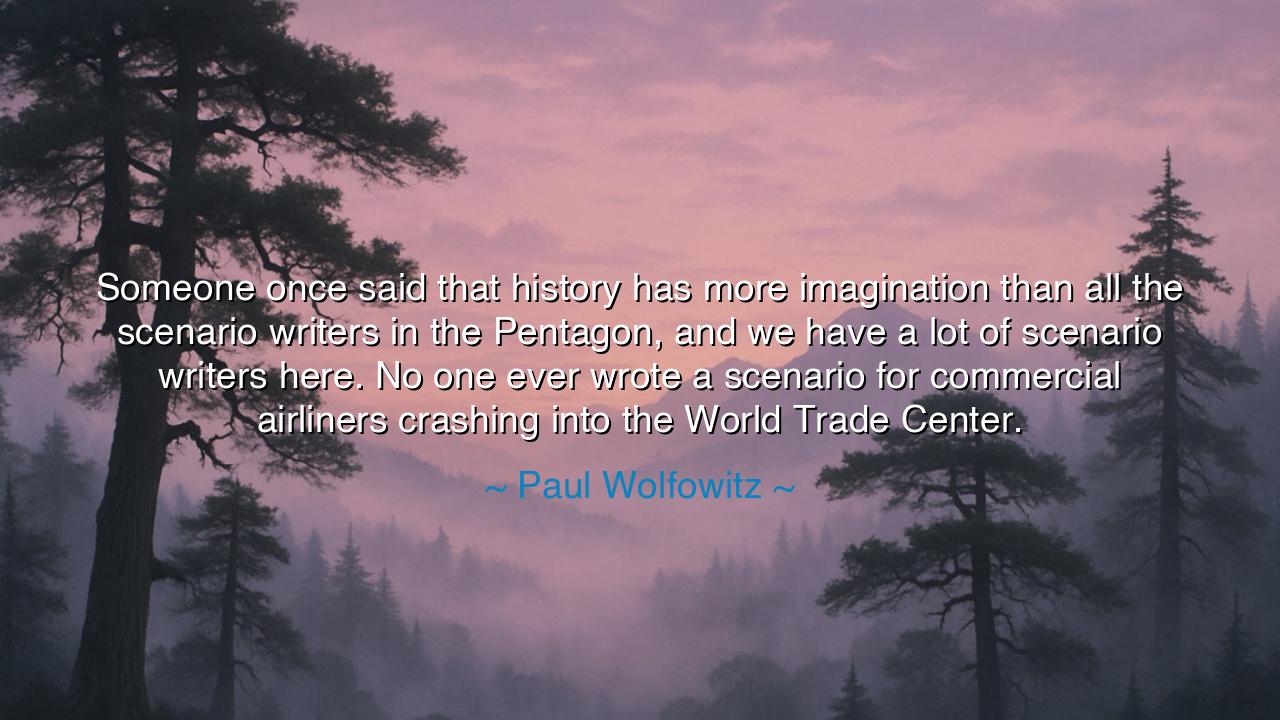
Someone once said that history has more imagination than all the
Someone once said that history has more imagination than all the scenario writers in the Pentagon, and we have a lot of scenario writers here. No one ever wrote a scenario for commercial airliners crashing into the World Trade Center.






"Someone once said that history has more imagination than all the scenario writers in the Pentagon, and we have a lot of scenario writers here. No one ever wrote a scenario for commercial airliners crashing into the World Trade Center." These words, spoken by Paul Wolfowitz, carry with them a weight of deep reflection on the unpredictable nature of history and the limits of human foresight. In his lament, Wolfowitz acknowledges the fundamental truth that despite all our planning, all our preparations, history can unfold in ways no mind—no matter how brilliant—could ever anticipate. It is not just a statement on the failure of intelligence or the impossibility of predicting every future event, but a reminder that the forces that shape our world are often beyond our control, and sometimes, beyond our comprehension.
History, as Wolfowitz notes, is often more creative, more inventive, and more unpredictable than any plan we can devise. It defies the best efforts of even the most skilled strategists and scenario writers, those who sit in rooms and project possible futures based on the patterns of the past. Yet, no matter how many plans we create, no matter how meticulously we try to predict the future, there will always be moments when history leaps beyond the bounds of imagination. The terrorist attacks of September 11th, with the horrific image of commercial airliners crashing into the World Trade Center, shattered the very idea of what was possible, showing that no scenario, no forethought, could have fully prepared humanity for such a tragedy.
Let us pause for a moment and consider the nature of imagination in this context. It is a force both powerful and elusive, capable of weaving grand visions of the future, yet often blind to the very events that shape it. Imagination is the tool of visionaries, but even the most brilliant of minds can be overwhelmed by the complexity of the world. For thousands of years, men and women have tried to foresee the future. The ancient oracles of Greece, the great philosophers, and the wise kings—they all sought to predict the unfolding of events. Yet, like the oracles of old, history itself remains an enigma. We may look upon the past with the wisdom of hindsight, but often, we are blind to the twists and turns that lie ahead.
Take, for example, the Roman Empire—its rulers and generals, the architects of its great strategy, could not have imagined the fall of Rome. For centuries, the empire was a beacon of strength and order. Yet, the barbarians at the gates, the internal corruption, the unseen forces of time and change, all played their parts in bringing down what once seemed invincible. The imagination of Rome’s rulers was powerful, yet they could not foresee the end that would come upon them. So too, in the modern world, we see that the most meticulous plans—whether for defense, economics, or diplomacy—are often undone by forces outside the realm of our imagining.
This is the lesson that Wolfowitz’s words impart: no matter how much we plan, no matter how many scenarios we write, we cannot foresee everything. There will always be elements of chaos, of randomness, that will shape the course of history. The terrorist attacks of 9/11 were a stark reminder that imagination—even the most well-crafted—can be blindsided by the reality of human action and fate. The world was forever changed by that day, and in the wake of it, we were forced to reimagine what was possible. Our plans, our scenarios, could not have prepared us for such a moment. And yet, it is the very uncertainty of history that compels us to move forward, to adapt, and to grow.
The lesson, then, is one of humility. We must acknowledge that no plan, no matter how thorough, can account for every possibility. We must not become too enamored with our visions of the future, for they are but fleeting glimpses that may be upended by the unforeseen. Instead, we must remain ever vigilant, prepared to adapt to the world as it unfolds before us. Like the great navigators of history, we must chart our course, but always be ready to adjust our sails when the winds of fate shift unexpectedly.
So, what practical actions can we take from this wisdom? First, we must embrace the unknown—the part of history that cannot be foreseen or controlled. We must not be paralyzed by the fear of uncertainty but rather use it as a tool for growth and resilience. Preparation is important, but flexibility is paramount. We must imagine the future, yes, but we must also be ready to accept that it will unfold in ways we cannot predict. And in the face of such unpredictability, we must remain steadfast, with the courage to adapt and the wisdom to learn from the unexpected.
Finally, let us remember the words of Paul Wolfowitz as a reminder of the great complexity of the world in which we live. No matter how much we try to control it, history remains a force far beyond our individual or collective imagining. And yet, it is this very mystery that drives us forward, that fuels our curiosity, and that challenges us to remain ever vigilant in the face of the unknown. It is not the certainty of the future that defines us, but our ability to respond to its unfolding with grace, imagination, and wisdom.






AAdministratorAdministrator
Welcome, honored guests. Please leave a comment, we will respond soon